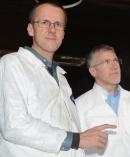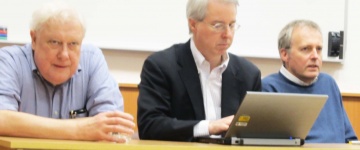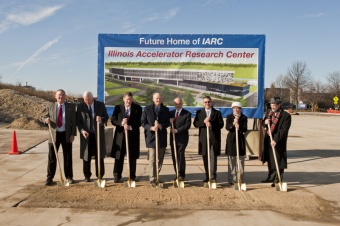Image of the week
Breaking ground for IARC
Just before the holiday, members of the US and Illinois governments gathered for a groundbreaking ceremony to officially begin construction on the future Illinois Accelerator Research Center, or IARC.
|
|
|
From left to right: Bob Kephart, IARC project director; Jim Siegrist, associate director of the Office of Science for the DOE Office of High Energy Physics; Michael Weis, DOE Fermilab site manager for the Office of Science; William Brinkman, director of the Office of Science for the DOE; Pier Oddone, Fermilab director; Warren Ribley, director of the Illinois Department of Commerce and Economic Opportunity; Linda Holmes, Illinois state senator; and Michael Fortner, Illinois state representative. |
|
In the News
-
from New Scientist11 January 2012We may not know what dark matter is, but we can still put it to work. The largest map of dark matter ever made is one of several new ones that will help to nail the properties of the equally mysterious dark energy, which is thought to drive the universe’s accelerating expansion.
-
from Fermilab Today10 January 2012When the International Linear Collider’s international committee selected superconducting RF technology for the ILC in 2005, one of the motivations for the decision was the potential utility of SRF technology for other fields of science and for even broader applications.
-
from KEK10 January 2012The Belle Experiment*4 has discovered two new unexpected particles at the KEK B Factory (KEKB). These new particles, termed Zb, contain both one ‘bottom’ quark (the second-heaviest quark among the known six types of quarks) and one ‘anti-bottom’ quark (the anti-particle of the bottom quark).
-
from NHK News7 January 2012Japan’s industry, academia and government collaborate towards the bid for the huge collider…The geological survey will be launched this year in two candidate construction sites for world largest accelerator. [also video clip]
-
from Fermilab Today5 January 2012Ten months after the earthquake and tsunami that devastated northern Japan, the Japan Proton Accelerator Research Complex (J-PARC) completed the first full test run for their system.
-
from BBC News4 January 2012The number of “eyes” scanning deep space in search of a particle that could shed light on our universe’s formation is about to multiply.
-
from Nature4 January 2012David Schlegel’s tool for exploring dark energy, one of nature’s biggest mysteries, is deceptively simple.
Copyright © 2026 ILC International Development Team




